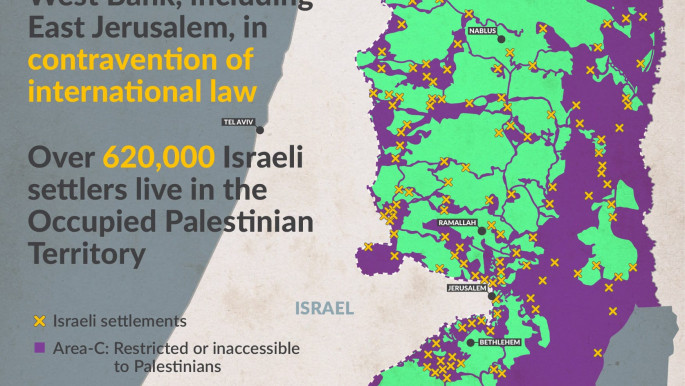Israel denies visas to UN staff over settlement blacklist
Israel denies visas to UN staff over settlement blacklist
Most of the UN OCHR's international staff have been forced to leave Israel this year after their visas were not renewed, a spokesman said.
2 min read
The OCHR compiled a list of 112 companies working in Israeli settlements [Getty]
Israel rejected the visa applications of several United Nations human rights workers this year following the publication of a blacklist of companies working in West Bank settlements, the Jerusalem Post reported.
Nine out of 12 international staff members for the UN's Office of the High Commissioner for Human Rights (OCHR) were forced to leave Israel since August after authorities refused to renew their visas, a spokesman said on Thursday.
Three other employees who were due to start work in Israel this year were denied entry to the country, spokesman Rubert Colville added. Another three will remain in the country until their visas expire.
In February, the UN OCHR published a blacklist of more than 100 international companies working in settlements in the occupied West Bank, east Jerusalem and the Golan Heights.
Israel occupied the West Bank and annexed east Jerusalem in 1967; it also occupied the Syrian Golan Heights during the 1967 war, later annexing the territory in 1981. The occupation, annexations and settlement construction in occupied territories are widely considered to be illegal under international law.
The OCHR blacklist did not accuse the 112 companies of violating international law. However, Israel described the list as an encouragemet to boycott.
Nine out of 12 international staff members for the UN's Office of the High Commissioner for Human Rights (OCHR) were forced to leave Israel since August after authorities refused to renew their visas, a spokesman said on Thursday.
Three other employees who were due to start work in Israel this year were denied entry to the country, spokesman Rubert Colville added. Another three will remain in the country until their visas expire.
In February, the UN OCHR published a blacklist of more than 100 international companies working in settlements in the occupied West Bank, east Jerusalem and the Golan Heights.
Israel occupied the West Bank and annexed east Jerusalem in 1967; it also occupied the Syrian Golan Heights during the 1967 war, later annexing the territory in 1981. The occupation, annexations and settlement construction in occupied territories are widely considered to be illegal under international law.
The OCHR blacklist did not accuse the 112 companies of violating international law. However, Israel described the list as an encouragemet to boycott.
Read more: The full list: Who are the 112 companies complicit in Israel's illegal settlement industry?
After the list's publication, the Israeli Foreign Ministry declared it would cut ties with OCHR.
Some OCHR staff were able to renew their visas for a short period following the publication of the blacklist, but all requests for visa renewals have been rejected since June.
A Foreign Ministry spokesman declined a request for comment by the Jerusalem Post on Thursday but referred to a February statement by Minister Israel Katz.
 |
| [Click to enlarge] |
"The Commissioner wasted an opportunity to preserve the dignity of the UN and salvage what was left of the [Human Rights] Council and Commission's integrity," Katz said, calling the blacklist a "stain" on the OCHR.
Palestinian-Israeli politician Yousef Jabareen meanwhile condemned the rejected visa renewals, terming them a "continuation of a policy of persecuting human rights activists that are supervising the violations of Palestinians' human rights".
The OCHR blacklist is dominated by Israeli companies, including leading banks, construction companies, supermarkets and mobile phone operators.
There are, however, also several prominent international firms, including travel companies like Airbnb, Expedia, TripAdvisor, Booking.com and Opodo. Many offer vacation rentals in the settlements.
Other names include consumer food maker General Mills, tech and communications giants Motorola Solutions and Altice Europe, and infrastructure companies like France's Egis and Alstom and British company JC Bamford Excavators.
Follow us on Facebook, Twitter and Instagram to stay connected



